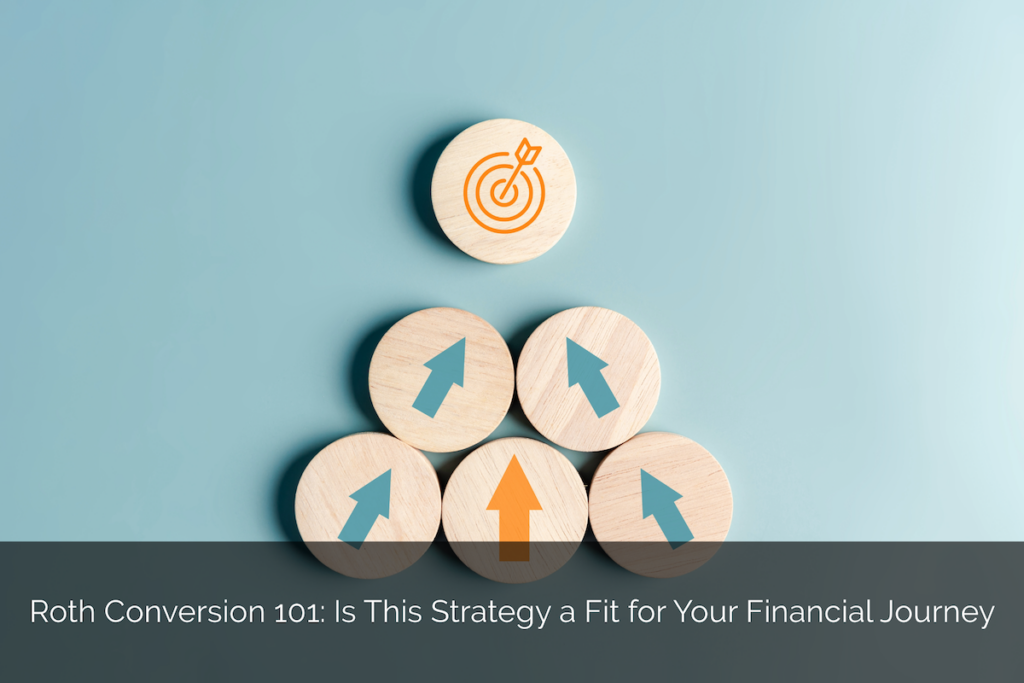Unlocking Your Financial Potential
In the ever-evolving landscape of personal finance, it’s smart to be continually on the lookout for ways that you can optimize your retirement strategy and minimize your tax burdens. One such strategy that is a savvy move for many people is the Roth conversion. This financial maneuver allows you to convert some or all of your traditional retirement savings into Roth assets, providing you with the opportunity to potentially boost your tax benefits in the long run.
If you’re considering a Roth conversion, read on to learn some of the basics of this strategy, key considerations, and guidance in determining if it’s the right move for your finances.
What is a Roth Conversion?
A Roth conversion is the process of transferring funds from a traditional retirement account, such as a Traditional IRA or 401(k), into a Roth IRA. The primary distinction between these two types of retirement accounts lies in the tax treatment of contributions and withdrawals.
In a traditional retirement account, contributions are typically tax-deductible, reducing your current taxable income. However, when you withdraw funds during retirement, those withdrawals are subject to ordinary income tax. On the other hand, Roth IRAs operate differently. Contributions are made with after-tax dollars, meaning they don’t provide an immediate tax deduction. However, the major advantage is that qualified withdrawals from a Roth IRA are entirely tax-free.
A Roth conversion involves taking money from your traditional account and moving it into a Roth account. This conversion is not without its costs since the amount converted is added to your taxable income in the year of the conversion. However, it can be a savvy financial move if you believe your future tax rate will be higher than your current rate, as you’ll pay taxes on the converted amount at your current rate rather than at the potentially higher rate you’d face in retirement.
SEE ALSO: Are You Making Costly Retirement Planning Assumptions?
Key Considerations for Roth Conversions
Before jumping into a Roth conversion, it’s essential to carefully evaluate your financial situation and objectives. Here are some key factors to consider:
1. Tax Implications
As mentioned earlier, one of the primary considerations is the immediate tax impact of a Roth conversion. The amount converted is added to your taxable income for the year of the conversion. If the conversion pushes you into a higher tax bracket, it could result in a substantial tax bill. Therefore, it’s crucial to assess whether you have the funds available to cover the additional tax liability without jeopardizing your financial stability.
2. Time Horizon
The benefits of a Roth conversion often materialize over the long term, so you’ll want to consider your time horizon for retirement. If you plan to retire in the near future, the potential tax savings from a conversion might be limited. However, if you have several years or even decades until retirement, a Roth conversion can have more significant benefits as your investments have more time to grow tax-free.
3. Investment Portfolio
Next, you’ll want to evaluate your investment portfolio within your retirement accounts. If you anticipate substantial growth in your investments, then a Roth conversion might be more appealing. Assets that appreciate significantly can provide more significant tax-free gains in a Roth IRA compared to a traditional retirement account.
4. Conversion Strategies
If you decide to do a Roth conversion, you don’t have to convert your entire traditional retirement account at once. There are strategies like partial conversions or spreading conversions over several years to give you time to manage the tax impact. These strategies can be particularly useful for individuals looking to control their tax liability while still taking advantage of the benefits of Roth IRAs.
EDUCATIONAL VIDEO: Roth Conversions with Arbor Capital’s Paul Hurley
Determining if a Roth Conversion is Right for You
Now that you understand the key considerations, let’s explore how you can determine if a Roth conversion aligns with your financial goals:
1. Financial Analysis
Begin by conducting a thorough financial analysis. This should include an assessment of your current tax situation, your expected tax situation in retirement, and the impact of a Roth conversion on your overall financial plan. If you’re unsure how to go about this or feel a bit overwhelmed, it may be helpful to consult a financial advisor or tax professional to help with this analysis.
2. Consider Your Goals
Next, take some time to think about your retirement goals. Are you looking to maximize your tax-free income in retirement, or are you more concerned with minimizing your tax liability now? Your objectives will play a significant role in whether a Roth conversion is the right choice.
3. Liquidity
If your analysis and goals lead you to decide that a Roth conversion works with your long-term aspirations, be sure that you have the liquidity to cover the tax bill that comes along with the conversion. Paying these taxes from the converted amount can erode the long-term benefits of the conversion, so it’s generally advisable to use funds outside of your retirement accounts to pay the taxes.
4. Evaluate Your Risk Tolerance
Roth IRAs offer tax-free growth potential, making them ideal for growth-oriented investments, so think about your risk tolerance and investment strategy. If your risk tolerance aligns with this strategy, a Roth conversion may be more appealing.
5. Consult a Professional
Seek advice from a qualified financial advisor or tax professional who can provide personalized guidance based on your unique circumstances. They can help you navigate the complexities of Roth conversions and ensure that your decision aligns with your broader financial plan.
Concluding Thoughts on Roth Conversions
A Roth conversion can be a powerful tool for optimizing your retirement strategy and reducing future tax liabilities. However, it’s not a one-size-fits-all solution. So, careful consideration of your current financial situation, future goals, and tax implications is essential. By conducting a thorough analysis and consulting with experts, you can determine if a Roth conversion is the right move for your finances and set yourself on a path towards a more secure retirement. Remember that financial planning is a dynamic process, and it’s essential to revisit your strategy periodically to ensure it continues to align with your evolving goals and circumstances.
If you’re ready to take the next step in optimizing your retirement strategy with a Roth conversion or other helpful tools, we can help. Arbor Capital’s team of experienced financial advisors is here to help you navigate the complexities and make informed decisions tailored to your unique financial goals. Contact us today for a personalized consultation and get one step closer to securing your financial future.












